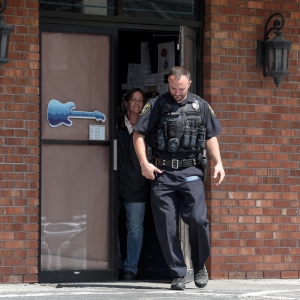Vermont House votes to establish overdose prevention centers
| Published: 01-16-2024 2:33 AM |
MONTPELIER — Calling it a “necessary part of the solution” to the opioid crisis, the Vermont House passed legislation Thursday that would establish two overdose prevention centers in the state. Gov. Phil Scott has suggested he would veto the bill if it reached his desk.
H.72 would pave the way for the sites by funding two locations and creating the legal framework that would allow them to operate.
On Thursday, the House gave its final approval by voice vote, sending the bill to the Senate.
The vote followed hours of sometimes emotional testimony and debate spread across two days, with lawmakers repeatedly describing how Vermont’s opioid crisis has impacted them on personal levels.
Rep. Emilie Kornheiser, D-Brattleboro, said one of her favorite parts of living in a small town is watching kids grow up. But due to opioids, “in the last 10 years I watched those children die. I’ve also grieved the deaths of my friends’ precious children, of my own loved ones, of clients,” Kornheiser, who works as a consultant for nonprofits, said on Wednesday afternoon, holding back tears. “And we can’t go on like this.”
Overdose tallies have continued an upward trend over the last three years, driven largely by fentanyl. While all corners of the state have experienced the crisis, cities like Burlington have been plagued by a rise in public substance use and unprecedented numbers of overdoses.
Over the next two hours in the House chamber, many other lawmakers shared similar stories: sisters, brothers, cousins, friends and constituents all having died due to opioid overdoses.
“We are at a crisis point,” said Rep. Taylor Small, P/D-Winooski on Wednesday. “It is clear that we need to expand our approach to address this crisis.”
Article continues after...
Yesterday's Most Read Articles
Overdose prevention centers are supervised locations where people using drugs can bring substances to use them with clean supplies. Staff on site are prepared to reverse an overdose if needed, which advocates say helps to stem fatal overdoses and provide pathways for drug users to seek help.
The bill calls for two such centers to be funded at a cost of about $1 million each as part of a pilot project that would be studied. The sites would be paid for from fees collected from pharmaceutical companies. The study is paid for with opioid settlement funds.
Burlington, via its mayor and City Council, has already signaled its willingness to host a site. Lawmakers haven’t been as specific about where they might like to locate the second center but have mentioned southern Vermont.
Small, having introduced the bill on the floor, faced pointed questions from those opposed to the bill on Wednesday and Thursday. Several Republican representatives said the bill would enable illegal drug use.
“Passage of H.72 will make Vermont drug dealers very happy,” said Rep. Arthur Peterson, R-Clarendon.
Republicans also pushed back on how the centers would be operated. As currently worded, the bill would direct the Vermont Department of Health to develop the guidelines on how the centers would be run, but critics said they were troubled by that lack of clarity.
Rep. Gina Galfetti, R-Barre Town, called the bill “full of vagaries” and argued that by passing it, “we are creating a situation where valued human beings are being seated on a plane with no pilot, no engine and no wings.”
Rep. Eric Maguire, R-Rutland City, himself a drug and alcohol counselor, said he supports the concept of overdose prevention centers. But he said he believes the model is doomed unless other treatment options are scaled up in the state.
He also wanted assurances that the federal government wouldn’t prosecute clients and staff at the sites and had concerns about who would staff the centers and what authority towns would have over them. While many observers argue the centers violate federal law by allowing the use of illicit substances, the Biden administration has not cracked down on existing sites in other states, such as two operating in New York City.
Maguire worked with members of the House Committee on Human Services on Thursday morning on an amendment that was ultimately approved that afternoon. As a result, centers must employ sufficient staffing “required for medical safety and treatment and referral support.” The new amendment also requires that town governments support in order for a center to open.
The overdose prevention center bill was carried over from the first half of the biennium last year. Originating in the House Committee on Judiciary, it was originally worded to provide immunity for overdose prevention centers but did not provide any funding to create the sites themselves.
The bill was later amended to include the creation of overdose prevention centers and moved among House committees but did not make it back to the floor for a vote until Wednesday. The Committee on Appropriations advanced the current version of the bill last week.
Despite much of the Legislature’s enthusiasm for the bill, Gov. Phil Scott remains opposed. During a press conference on Wednesday afternoon, Scott said he notified House and Senate leadership of his position, calling the bill “a bridge too far.”
“I just don’t think a government entity should be in the business of enabling those who are addicted to these drugs that are illegal,” Scott said.
Scott noted that in the 10 years since then-Gov. Peter Shumlin devoted an entire annual address to the subject of opioid overdoses, the drug mix on the street has changed.
It is now dominated by fentanyl and other substances rather than heroin or prescription opioids.
“We have to adapt to that,” Scott said. “But I still don’t believe that allowing for a safe injection is a way to counter them.” Scott said that instead of overdose prevention centers, the state should focus on expanding the “four legs of the stool”: treatment, recovery, prevention and enforcement.
In 2022, Scott vetoed a bill that would have studied how overdose prevention centers might operate in Vermont.






 After more than 45 years, Upper Valley guitar shop closes
After more than 45 years, Upper Valley guitar shop closes On the trail: Gov. Ayotte says she delivered on her promises in her 100 days in office. Not everyone agrees
On the trail: Gov. Ayotte says she delivered on her promises in her 100 days in office. Not everyone agrees Windsor snow globe business fears Trump tariffs
Windsor snow globe business fears Trump tariffs Fill ’er up: New Hampshire considers allowing patrons to pour their own alcohol
Fill ’er up: New Hampshire considers allowing patrons to pour their own alcohol 
